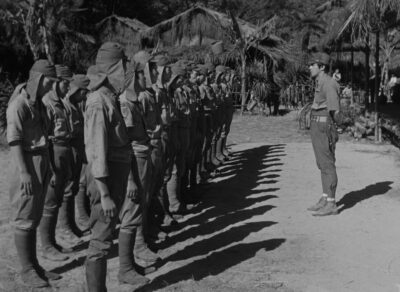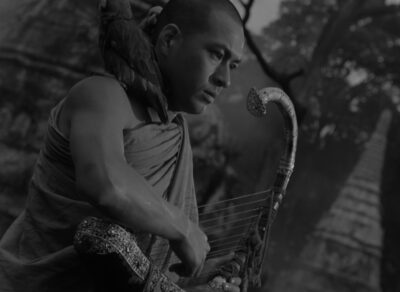In the last days of World War II, a Japanese platoon sustains morale through the Burma campaign by singing traditional songs, accompanied by the delicate harp-playing of Private Mizushima. After the unit surrenders to British forces, Mizushima is tasked with convincing a holdout of cave-dwelling Japanese soldiers to lay down their arms; when his mission fails, he is counted among the dead. Mizushima survives, however, and becomes a monk who dedicates his life to providing proper burials for his fallen comrades. Meanwhile, his former platoon attempts to track him down by using music to express a shared sense of separation and longing for home. Adapted from Michio Takeyama’s classic novel, and renowned for legendary composer Akira Ifukube’s haunting score, Kon Ichikawa’s The Burmese Harp is an epic humanist masterpiece—a profound contemplation of suffering, redemption, and spiritual fortitude during the darkest periods of violence.“A HAUNTING ELEGIAC REVERIE.” – Kevin Thomas, Los Angeles Times“Poetically photographed… brilliantly dots the players against the looming terrain.” – Howard Thompson, New York TimesProduction history (via Janus Films):In the early 1950s, Kon Ichikawa was toiling away for Toho Studios, churning out several films a year (in 1951 alone, he directed six) and settling into the role of a dependable if unremarkable metteur en scène. It was during this period that Ichikawa read The Burmese Harp— Michio Takeyama’s popular children’s novel from 1946—and “felt this strong sense of mission, a call from the heavens” to adapt it on film. This fascination would transform the director’s career, catapulting him into the upper echelons of Japanese cinema. At the time, Ichikawa was working closely with his wife, screenwriter Natto Wada, who authored or coauthored many of his scripts. Whereas Takeyama’s novel was conceived as a “fairy tale for adults,” Ichikawa intended a grittier take on the human suffering of World War II and the Japanese military’s self-destructive nationalism. Ichikawa and Wada also shifted the dramatic emphasis by having the protagonist, Private Mizushima (Shoji Yasui), decide earlier in the story to remain in Burma to bury his dead comrades, after Japan’s failed campaign there. And while in Takeyama’s tale, cannibals nurse Mizushima back to health in hopes of eating him—“exotic” details from a novelist who had never set foot in Burma—in Ichikawa’s version, the soldier is saved by a Buddhist monk, whose noble compassion in service of others is one of the film’s major themes.

